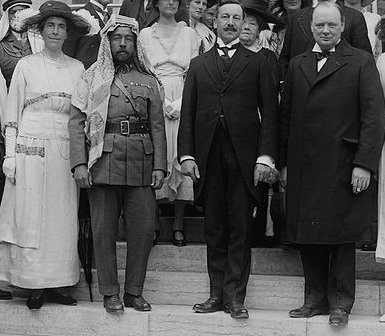Pages in Section 2

Formation of the Palestine Police
ii. The Peoples of Palestine in 1920
iii. Early Port Police
iv. Early Clashes
v. Brief Existence of the PDF
vi. Formation of the Palestinian Gendarmerie
vii. Captain James Wesley Mackenzie
viii. 1922 Formation of the British Gendarmerie
NEXT SECTION
 With the formation of a Civil Government in OETA South on July 1st 1920, the Palestine Police Force came into official existence. Its first dedicated Police Commander was Lt. Col. P.B. Bramley, O.B.E., who had already, before the commencement of the civil government, been preparing to unify the police forces scattered throughout Palestine. Although the civil government had already divided Palestine into seven administrative areas, Colonel Bramley wanted just one police force divided into three districts, North Palestine, South Palestine and Jerusalem.
With the formation of a Civil Government in OETA South on July 1st 1920, the Palestine Police Force came into official existence. Its first dedicated Police Commander was Lt. Col. P.B. Bramley, O.B.E., who had already, before the commencement of the civil government, been preparing to unify the police forces scattered throughout Palestine. Although the civil government had already divided Palestine into seven administrative areas, Colonel Bramley wanted just one police force divided into three districts, North Palestine, South Palestine and Jerusalem.
 The High Commissioner, Sir Herbert Samuel, took up post on July 1st 1920 but was not sworn in until September 1922. The Police Ordinance of 1921 was promulgated as law by the British Government eight months after the Palestine Police came into being, which posed a big question mark over the new police force's right to be considered 'legal Police'. There was even a question mark over that Police Ordinance, since the League of Nations did not ratify Britain as the mandatory power for Palestine until July 24th 1922 and even then the mandate did not become operative until September 1923.
The High Commissioner, Sir Herbert Samuel, took up post on July 1st 1920 but was not sworn in until September 1922. The Police Ordinance of 1921 was promulgated as law by the British Government eight months after the Palestine Police came into being, which posed a big question mark over the new police force's right to be considered 'legal Police'. There was even a question mark over that Police Ordinance, since the League of Nations did not ratify Britain as the mandatory power for Palestine until July 24th 1922 and even then the mandate did not become operative until September 1923.
In October 1920, the British created a separate Gendarmerie (the Arab Legion) in Transjordan,based in Zarqa, to be paid for from local finances. Emir Abdullah was its honorary colonel, but a British officer, Captain Frederick Gerard Peake, was in practical command.
The Legion's task was to defend Transjordan against both internal and external threats. 805 of its men were local Chechens who had served in the Arab army during its 1916 revolt against the Ottoman Empire.
At this stage there were no rank and file British police. The civil police establishment, mostly urban consisted of 18 British Gazetted Officers, supported by 55 Palestinian Officers and 1,144 rank and file. The 18 British Police came from the military members of the OETA administration . Their brief:-
- To fulfill the ordinary duties of a constabulary, such as the preservation of law and order and the prevention and detection of crime.
- To act, when their numbers allowed, as escorts for the protection of tax collectors and Government treasure throughout the country.
- To serve summonses issued by the judicial authorities and distribute Government notices.
Arab police greatly outnumbered Jewish police although there were still more Jewish police in relation to the size of the Jewish population than there were Arab police to the size of the Arab population
The towns and cities were already well served by the urban police but Colonel Bramley wanted police of similar standards serving in the rural areas. As soon as Palestine came under civilian administration he appointed more British officers called by the Indian term British Reserve Inspector which could be translated as Assistant District Commandant and started a training scheme for the rank and file.
Unfortunately much of Colonel Bramley's good work was ruined when the government announced police pay cuts. This coincided with the ban on printing the Balfour Declaration on Palestine being lifted and the disclosure by communist Russia of the Sykes-Picot agreement. Many Arab police left the force but the Zionist organization subsidised Jewish police to remain.